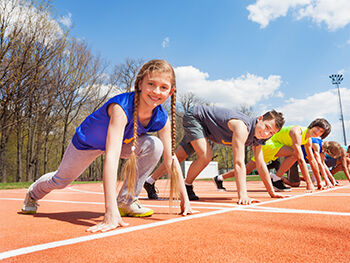University News Last updated 22 June 2021

Birmingham City University students have designed a series of competitive sporting challenges for primary school pupils across Birmingham during National School Sport Week 2021 (19 – 25 June).
The activities set by the students, which are based on popular sports such as cricket and rugby, make up the fourth of four themed weeks of sport throughout the summer during this year’s Birmingham School Games.
The city-wide sporting competition forms part of the School Games, a government led programme delivering competitive school sport to young people across the country.
The Birmingham School Games are also linked to the United by Birmingham 2022 community programme, which is part of the Birmingham 2022 Commonwealth Games and which supports grass-roots projects that benefit local communities.
The 22 Birmingham City University students, all of whom are training to be primary school teachers themselves, were set the task of coming up with child-focused, fun, physical activities by Angela Whitehouse, Senior Lecturer in Primary Physical Education.
Angela leads a PE module on the University’s PGCE teacher training programme, which as well as covering physical education on the curriculum, also looks at how physical activity and sport can benefit children in their daily lives beyond school at home and in their local community.
Children’s participation in physical education and organised sports has been severely disrupted over the last twelve months as a result of the COVID-19 pandemic. Earlier this year Angela teamed up with Helen Tonks, one of Birmingham’s 11 School Games Organisers, and Sarah Lay, a PE consultant working in Birmingham Schools, to design ‘PE at Home’ resources that children could do at home while schools closed during lockdown.
With restrictions easing and with an eye on National School Sport Week and next year’s Games, Angela and the Birmingham School Games organisers joined forces again to develop a new suite of activities but this time with a team-based competitive element. Having been briefed to adapt popular sports into simple competitive challenges for children that could be done without the need for specialist equipment or facilities, Angela’s trainees got to work.
The result of their efforts, which took three months to design and develop through a virtually taught session, trials and testing, is a series of five sporting contests based on cricket, handball, volleyball, dodgeball and rugby. All of the sports have seen the rules stripped down and all can be performed at school or at home using everyday items, for example substituting carefully balanced cans for cricket stumps.
The trainees have produced a set of resources, including information cards and videos containing instructions on how to play, what equipment to use and tips on how to adapt each challenge to make it more inclusive or to ramp up the difficulty level.
School Games Organisers in Birmingham have distributed the resources to every primary school in the city so pupils can do the challenges on a daily basis throughout National School Sport Week. Each school is able to log its results with the School Games programme and prizes will be awarded to the winning teams at the end of the week.
Angela Whitehouse, Senior Lecturer in Primary Physical Education at Birmingham City University, said:
“Physical education and sport can play an important role in children’s development and aside from helping them keep active and have fun, they also encourage teamwork, and help children learn about rules, fairness and respect for others.
"Those are all attributes that teachers work to instil in their pupils, so with National School Sport Week approaching I thought it would be a really good test for our trainees to come up with some sport themed challenges aimed at primary school pupils.
Helen Tonks, School Games Organiser for the King Edwards Aston School Sport Partnership, added:
“It’s often said that sport is a great ‘leveller’ but the reality is there isn’t equal participation among children within Birmingham and across the country as a whole. That’s really the purpose of the School Games – to improve access to sport for all children whatever their background or circumstances.